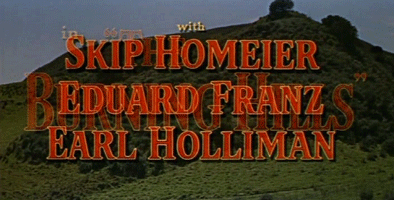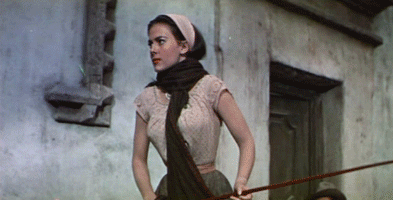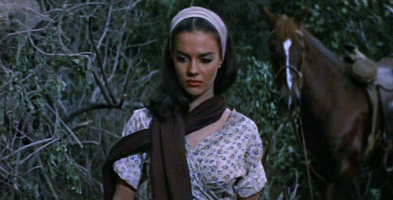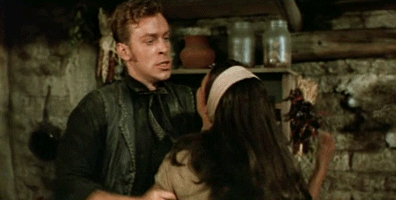--
--

oooooooooooooooooooooooooooooooooooooooooooooooooooooooooooooooooooooooooooooooo
CRITICA EN EL PERIODICO "LA VANGUARDIA" (31-3-1962)
"Western" clásico y típico, con todos los requisitos, bastante elementales y primitivos, que exige este género, tal como se hacían en los tiempos de Tony Mix. El color y el cinemascope han provisto a la realización relieve y novedad. Por lo demás, se diría que por el cine "por el cine de Stuart Heísler, realizador del film" no ha pasado el tiempo. El clima, el argumento, los paisajes y los personajes son los clásicos. Hay grandes galopadas, tiros a granel, un combate con los indios comanches, previsibles peleas cuerpo a cuerpo y una persecución persistente, infatigable frenética y cruel, en la que los "malos", los perseguidores, que son muchos, acaban siendo liquidados por el "bueno", que es uno sólo. Pero éste es un hombre joven, templado y de gran corazón, a quien Dios y el amor "éste en forma de una guapaza mestiza" ayudan a escapar ileso de todos los riesgos y acechanzas. Naturalmente, todo esto no deja de tener su emoción. Emoción ingenua, unas veces; otras vigorosa, y otras enrevesada de la sorpresa que tales abominables seres hayan podido poblar algún día el Oeste americano. En ocasiones, uno pregunta cómo si todos estos horrores eran cosa corriente en el Far West, para nadie llegar a viejo en aquellas tierras ásperas, desérticas y ardientes. Pero la verdad es que sobrevivieron aunque fuesen pocos. En "Colinas Ardientes" sólo escapa con vida uno "el bueno" de los treinta o cuarenta que entran en acción. Es posible que de esta manera "es decir matando tantos malos" el país se depurará y haya llegado a ser la gran nación que és hoy. Enfocadas las cosas así "como grandes matanzas de malos" el western viene a darnos una visión muy elocuente y expresiva de la historia de Estados Unidos. Todos los malos murieron en el Oeste a manos de los buenos, con infalible puntería. Luego, los buenos van liderando, como era natural. El film, ha sido realizado en color con bastante pericia. La cámara es movida con precisión y tino, los hoscos personajes "westernianos" aparecen caracterizados con esa sorprendente maestría a que ha llegado en el género el cine de Hollywood. Los dos principales intérpretes son Tab Hunter "no hay que confundir con Jefrey Hunter" y Natalie Wood. Son dos artistas jóvenes, pero de gran temperamento, y destinados a alcanzar el estrellato sólido. Sobre todo, ella una joven de fuerte personalidad y original belleza, con grandes ojos negros y un buen estilo de comedianta, dando vida, a la figura de una mestiza de yanqui y mejicana. Natalie Wood alcanza realmente cotas de gran acierto. A. MARTÍNEZ TOMAS.
ooooooooooooooooooooooooooooooooooooooooooooooooooooooooooooooooo
Tab Hunter Gets in the Saddle
Soon after his brother has been shot to death, handsome Tab Hunter (as Trace Jordan) arrives in the western town of "Esperanza". Along with Mr. Hunter, we quickly learn the man responsible for murdering brother is young cigar-stomping Skip Homeier (as Jack Sutton). As it turns out, Mr. Homeier and his gang have run the sheriff out of town; they also shoot anyone who tries to stake a claim in the area. Hunter is advised to leave town immediately, but refuses. With his muscular frame and quick draw, Hunter easily infiltrates the Sutton ranch, to demand justice.
Wounded in a shoot-out, Hunter barely escapes from the ranch. He collapses near the home of sexy sheepherder Natalie Wood (as Maria Colton). Taunted by the "Sutton Gang" due to her mixed heritage (English father, Mexican mother) and preference for dresses that accentuate her beautifully-shaped breasts, Ms. Wood hides Hunter from Homeier, and nurses him back to health. Hunter and Wood are mutually attracted to each other. Hunter hopes to report Homeier and his gang to the United States Cavalry at nearby Fort Stockwell. Will he get there?
Warner Bros. must have known putting popular but unproven Hunter in this high-budgeted CinemaScope western would be a gamble - but, it pays off. He always fit the genre like a glove, and it's too bad a long string of Hunter westerns wasn't forthcoming. Hunter's greatest asset, herein, isn't really his handsomeness; rather, it's that he adds a muscular athleticism to the usual western antics. As you'll plainly see, there was no need to fear Hunter would snap a girdle, or slip a toupee. Trying on a Spanish accent, Wood is tightly outfitted, and highly arousing.
Homeier turns in a wonderfully nasty supporting performance. Mixed-raced "Indian" tracker Eduard Franz (as Jacob Lantz), limping liquor-soaked Earl Holliman (as Mort Bayliss), and foreman Claude Akins (as Ben Hindeman) lead a strong supporting cast. With sexless romance and Spanish stereotypes, writer Louis L'Amour (book) and Irving Wallace (script) break no new ground, but you know how these western stories go. Director Stuart Heisler corrals the young stars well; he left feature films for dependable work on episodic western television.
ooooooooooooooooooooooooooooooooooooooooooooooooooooooooooooooooooooooooooooo
No Clear Title, No Legally Constituted Posse
Louis L'Amour novels make good reading and fine western cinema and The Burning Hills is no exception. Tab Hunter and Natalie Wood who were a screen team and studio public relations created off screen romance star in this film which has Tab Hunter on the run and Natalie Wood helping him.
Hunter's got plenty of reason to run, his brother was killed and he shoots Ray Teal who is the overlord of the local Ponderosa. The wounded Teal who really doesn't have title to a lot of the land he runs roughshod over and he sends his rotten son Skip Homeier and foreman Claude Akins with some of his riders after him. At no time are they a legally constituted posse and Homeier and Akins can't stand each other and have many issues between them.
oooooooooooooooooooooooooooooooooooooooooooooooooooooooooooooooooooooooooooooo
An excellent, well-cast and well-acted western.
Both Tab Hunter and Skip Homeier put in excellent performances in this film. Both are well-cast for the roles they play - Tab, the "good guy" and Skip, the "bad, ruthless killer." The final fight scene between Tab Hunter and Skip Homeier is one of the best I have seen staged in a western. The final outcome was in no way predictable. The movie stands up well after 40 years.
oooooooooooooooooooooooooooooooooooooooooooooooooooooooooooooooooooooooooooooo
Two young lovers flee a murderous rancher's posse.
In 1956, Warner Bros. paired up two of their most promising young contract players in this movie and one other, The Girl He Left Behind. Unfortunately for the studio, neither film caught fire. Hunter certainly had the All-American good looks but in the acting department was no James Dean, while Wood's struggle here with a Mexican accent amounts to little more than an honest effort.
Wisely, the studio stacked the dialog with a veteran supporting cast—Akins, Franzen, and Teal —who carry most of the lines. At the same time, was there ever a better nasty young punk than the great Skip Homeier, who could hold his own with any heavyweight actor. Also, it's too bad the young Earl Holliman didn't have matinée good looks because he could have injected real feeling into Trace's pivotal part.
The cast itself gets to ride around greater LA in a generally non-scenic Technicolor Western. However, the showpiece brawl over the big rocks and into the roaring river is a real doozy. Hunter certainly earned his salary with that one. Then too, Franzen's Indian tracker is nicely conceived and adds a good ironical touch to the fairly predictable outcome.
All in all, the movie amounts to little more than a minor vehicle for two of the studio's attractive young stars. The talented Wood, at least, would go on to bigger and better things.
oooooooooooooooooooooooooooooooooooooooooooooooooooooooooooooooooooooooooo
Natalie Wood And Tab Hunter In A Western
Louis L'Amour wrote well-structured western stories that were very entertaining. Usually, there's a hero who never goes out of his way to hurt anyone. And the force(s) of villainy are clearly defined. But Hollywood wanted to pair Natalie Wood and Tab Hunter, so the love story in this film includes some amorous un-L'Amourous scenes to cater to young viewers.
The first couple of scenes establish who our hero is (Tab Hunter as Trace Jordan) and how bad the villains are. Natalie plays Maria, a strong-willed young woman who is also victimized by the gang of gunslingers who enforce the evil dictates of one Joe Sutton (Ray Teal). After Trace attempts to bring the bad guys to justice, they chase him over the countryside. Maria tries to help him.
Members of the gang include Claude Akins, who also appeared in "The Sea Chase" with Tab Hunter in 1955. One of the orneriest gang members is played by Earl Holliman. After this film, he would appear consecutively in "Giant", "The Rainmaker" and "Gunfight at the O.K. Corral". Talk about being in the right places at the right time.
Unfortunately, certain scenes are marred by some very corny lines. The result is a great L'Amour story burdened by Hollywood "enhancements". You can judge for yourself if Natalie Wood's accent is horrible or not. She surely took a lot of criticism for Maria's accent in "West Side Story", which would follow in five years.
oooooooooooooooooooooooooooooooooooooooooooooooooooooooooooooooooooooooooooooooo
--



.png)

.jpg)















































































































































.JPG)



















No comments:
Post a Comment